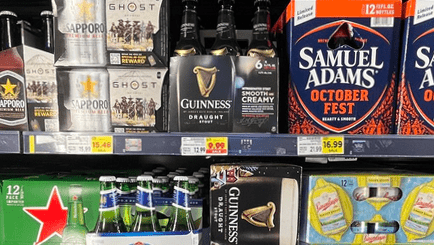With their mix of wellness benefits, recreational appeal, and cultural coolness, cannabis and hemp beverages are emerging as legitimate contenders to alcohol, if not outright replacements. Hemp-derived CBD drinks and THC-infused cannabis beverages are not just trends—they’re laying the groundwork for an entirely new portion of the drink market. And the big question on everyone’s mind: Will a cannabis or hemp drink brand rise to the level of Redbull or Monster?
Hemp vs. Cannabis Beverages: What’s the Difference?
Let’s start by clarifying the distinction. Hemp beverages, typically made with hemp-derived CBD, are non-psychoactive. They’re marketed as wellness drinks, focusing on relaxation, stress relief, and even workout recovery. Think of them as the natural evolution of kombucha or functional water.
Cannabis beverages, on the other hand, contain THC, the psychoactive compound that gets you high. These drinks cater to a more recreational crowd, offering a buzz similar to alcohol but without the calories, hangovers, or risks associated with binge-drinking. Both categories are experiencing rapid growth, but each targets a distinct consumer base.
Why Hemp and Cannabis Drinks Are Winning
- Consumer Wellness Trends
Wellness is no longer a niche—it’s a lifestyle. Hemp beverages, with their calming effects and lack of psychoactivity, are becoming staples for those looking to manage stress without turning to pharmaceuticals or alcohol. Brands like Recess and Day One are blending CBD with flavors like cucumber or yuzu to create drinks that are as stylish as they are functional. - The Alcohol Alternative
THC beverages, on the other hand, are positioning themselves as a more socially and physically friendly replacement for alcohol. Low-dose THC drinks are especially popular among millennials and Gen Z, who are less interested in getting wasted and more focused on “light buzz” socializing. - The “Better for You” Movement
Both hemp and cannabis drinks capitalize on the growing demand for products that are perceived as healthier. They offer lower sugar, fewer calories, and no hangover—advantages alcohol simply can’t compete with.
Challenges on the Road to Dominance
Let’s be real: the hemp and cannabis beverage industry isn’t without its hurdles.
- Regulatory Red Tape
THC-infused beverages are heavily regulated, with state-by-state laws that complicate distribution. Hemp drinks are in a slightly better position, thanks to the 2018 Farm Bill, but even they face labeling and marketing challenges. - Consumer ConfusionMany people still don’t understand the difference between hemp and cannabis, or how dosing works for CBD and THC drinks. Education will be critical for the market to reach its full potential.
- Distribution Limits
Unlike soda or energy drinks, cannabis beverages can’t yet sit on grocery store shelves. Hemp drinks are making headway here, but until cannabis is federally legal, widespread retail dominance remains elusive.
Will Hemp and Cannabis Drinks Have a Redbull Moment?
The short answer: absolutely. The cannabis and hemp beverage market is ripe for a breakout brand—or several.
Hemp beverages could produce their own version of LaCroix or Bai, especially as functional drinks gain popularity. Recess, for example, is positioning itself as the “calm in a can” answer to energy drinks, with sleek packaging and a focus on stress-free vibes.
For THC beverages, the race to be the “Redbull of cannabis” is wide open. Cann is leading the charge with its low-dose THC sodas that are perfect for casual social settings. Meanwhile, larger companies like Tilray are investing heavily in distribution networks, aiming to dominate once federal legalization clears the way.
The Role of Hemp in Bridging the Gap
Hemp beverages, which can already be sold in mainstream stores, are crucial for introducing the concept of cannabis-infused drinks to a broader audience. These products help normalize the idea of drinking cannabinoids, paving the way for THC beverages to enter the spotlight once regulations catch up.
Hemp drinks are also a safer bet for major beverage players like Coca-Cola or PepsiCo, who are eyeing the cannabis space but hesitant to dive into the complexities of THC. Expect to see more CBD-infused sparkling waters, teas, and even energy drinks hit shelves soon.
The Future: Hemp and THC Drinks Coexisting
The beauty of this market is that hemp and THC drinks don’t compete—they complement each other. Hemp beverages are the wellness warriors, while THC drinks are the nightlife disruptors. Together, they’re creating a comprehensive ecosystem of cannabis-infused beverages that cater to nearly every consumer need.
Final Thoughts: A Market Ready to Bloom
Cannabis and hemp beverages are no longer fringe products—they’re mainstream disruptors with the potential to redefine how we drink. As the industry overcomes regulatory and educational hurdles, the opportunity for brands to dominate the space is immense.
Will we see a hemp drink become the next LaCroix or a THC soda rise to Redbull status? The answer is yes—it’s only a matter of time. But even more exciting is the possibility that these products won’t just compete with traditional drinks—they’ll create an entirely new category that reshapes what we drink and why we drink it.
For now, the cannabis beverage revolution is just beginning. Whether you’re team hemp or team THC, one thing is clear: this market is high on potential.

